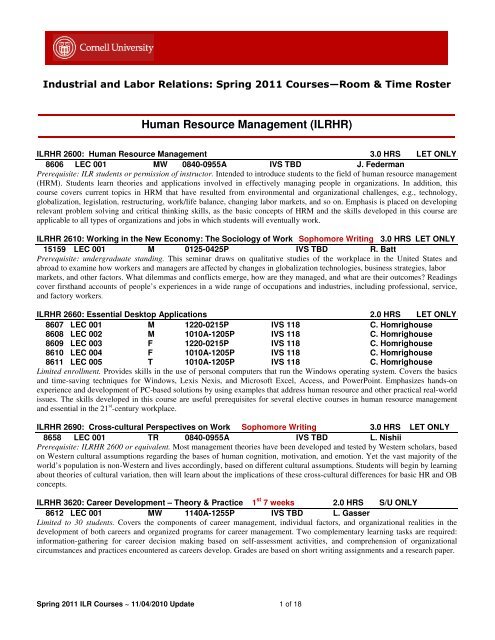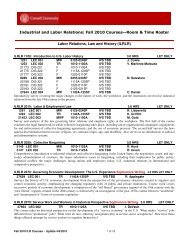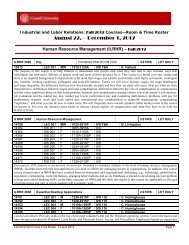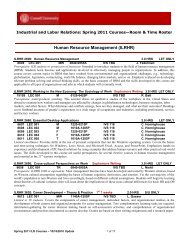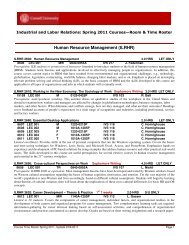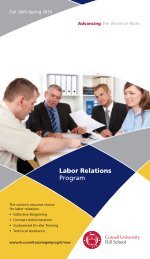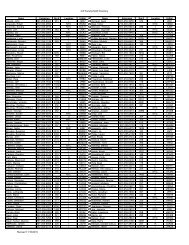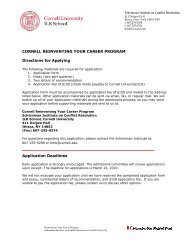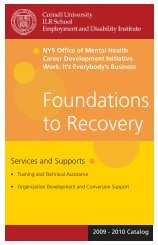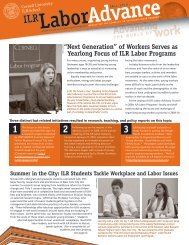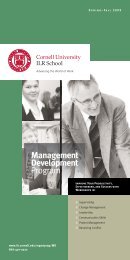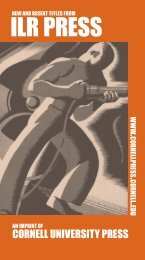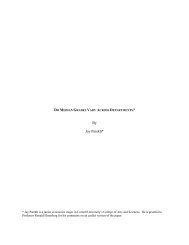Human Resource Management (ILRHR) - ILR School
Human Resource Management (ILRHR) - ILR School
Human Resource Management (ILRHR) - ILR School
Create successful ePaper yourself
Turn your PDF publications into a flip-book with our unique Google optimized e-Paper software.
Industrial and Labor Relations: Spring 2011 Courses—Room & Time Roster<br />
<strong>Human</strong> <strong>Resource</strong> <strong>Management</strong> (<strong><strong>ILR</strong>HR</strong>)<br />
<strong><strong>ILR</strong>HR</strong> 2600: <strong>Human</strong> <strong>Resource</strong> <strong>Management</strong> 3.0 HRS LET ONLY<br />
8606 LEC 001 MW 0840-0955A IVS TBD J. Federman<br />
Prerequisite: <strong>ILR</strong> students or permission of instructor. Intended to introduce students to the field of human resource management<br />
(HRM). Students learn theories and applications involved in effectively managing people in organizations. In addition, this<br />
course covers current topics in HRM that have resulted from environmental and organizational challenges, e.g., technology,<br />
globalization, legislation, restructuring, work/life balance, changing labor markets, and so on. Emphasis is placed on developing<br />
relevant problem solving and critical thinking skills, as the basic concepts of HRM and the skills developed in this course are<br />
applicable to all types of organizations and jobs in which students will eventually work.<br />
<strong><strong>ILR</strong>HR</strong> 2610: Working in the New Economy: The Sociology of Work Sophomore Writing 3.0 HRS LET ONLY<br />
15159 LEC 001 M 0125-0425P IVS TBD R. Batt<br />
Prerequisite: undergraduate standing. This seminar draws on qualitative studies of the workplace in the United States and<br />
abroad to examine how workers and managers are affected by changes in globalization technologies, business strategies, labor<br />
markets, and other factors. What dilemmas and conflicts emerge, how are they managed, and what are their outcomes? Readings<br />
cover firsthand accounts of people’s experiences in a wide range of occupations and industries, including professional, service,<br />
and factory workers.<br />
<strong><strong>ILR</strong>HR</strong> 2660: Essential Desktop Applications 2.0 HRS LET ONLY<br />
8607 LEC 001 M 1220-0215P IVS 118 C. Homrighouse<br />
8608 LEC 002 M 1010A-1205P IVS 118 C. Homrighouse<br />
8609 LEC 003 F 1220-0215P IVS 118 C. Homrighouse<br />
8610 LEC 004 F 1010A-1205P IVS 118 C. Homrighouse<br />
8611 LEC 005 T 1010A-1205P IVS 118 C. Homrighouse<br />
Limited enrollment. Provides skills in the use of personal computers that run the Windows operating system. Covers the basics<br />
and time-saving techniques for Windows, Lexis Nexis, and Microsoft Excel, Access, and PowerPoint. Emphasizes hands-on<br />
experience and development of PC-based solutions by using examples that address human resource and other practical real-world<br />
issues. The skills developed in this course are useful prerequisites for several elective courses in human resource management<br />
and essential in the 21 st -century workplace.<br />
<strong><strong>ILR</strong>HR</strong> 2690: Cross-cultural Perspectives on Work Sophomore Writing 3.0 HRS LET ONLY<br />
8658 LEC 001 TR 0840-0955A IVS TBD L. Nishii<br />
Prerequisite: <strong><strong>ILR</strong>HR</strong> 2600 or equivalent. Most management theories have been developed and tested by Western scholars, based<br />
on Western cultural assumptions regarding the bases of human cognition, motivation, and emotion. Yet the vast majority of the<br />
world’s population is non-Western and lives accordingly, based on different cultural assumptions. Students will begin by learning<br />
about theories of cultural variation, then will learn about the implications of these cross-cultural differences for basic HR and OB<br />
concepts.<br />
<strong><strong>ILR</strong>HR</strong> 3620: Career Development – Theory & Practice 1 st 7 weeks 2.0 HRS S/U ONLY<br />
8612 LEC 001 MW 1140A-1255P IVS TBD L. Gasser<br />
Limited to 30 students. Covers the components of career management, individual factors, and organizational realities in the<br />
development of both careers and organized programs for career management. Two complementary learning tasks are required:<br />
information-gathering for career decision making based on self-assessment activities, and comprehension of organizational<br />
circumstances and practices encountered as careers develop. Grades are based on short writing assignments and a research paper.<br />
Spring 2011 <strong>ILR</strong> Courses ~ 11/04/2010 Update 1 of 18
<strong><strong>ILR</strong>HR</strong> 3670: Employee Training & Development 4.0 HRS LET ONLY<br />
12008 LEC 001 MW 1140A-1255P IVS TBD B. Bell<br />
Faced with increasing competition, globalization, technological complexities, and dynamic labor markets, firms increasingly are<br />
struggling to determine the best approaches to training and developing their workforces. This course introduces the issues,<br />
concepts, and processes with which firms are wrestling, as well as specifics on planning, designing, implementing, and<br />
evaluating training and development programs. After completing this course, participants should be able to conduct a needs<br />
assessment, evaluate employee readiness, evaluate the strengths and weaknesses of various training and development techniques,<br />
solve transfer of learning problems, and design evaluation procedures.<br />
<strong><strong>ILR</strong>HR</strong> 4612: Compensation in Service Firms (also <strong><strong>ILR</strong>HR</strong> 6622, HADM 4412, 6612) 3.0 HRS LET ONLY<br />
12806 LEC 001 TR 1140A-1255P STL TBD M. Sturman<br />
Prerequisite(s): Introductory human resource course such as HADM 2211 (formerly HADM 211) or <strong><strong>ILR</strong>HR</strong> 2600. Co-meets with<br />
HADM 4612). This course is designed to give students a practical understanding of the methods and implications of<br />
compensation, including hands-on experience designing compensation systems for firms in the service industry. (The course is<br />
designed to provide material that is distinct from that provided in <strong><strong>ILR</strong>HR</strong> 6690 Managing Compensation.) Students will learn<br />
how to design a pay plan, including base pay and pay-for-performance plans. By the completion of the course, participants will<br />
know how to design pay ranges and grades for organizations where most jobs can be benchmarked with market data. The course<br />
will also devote considerable time to the design of incentive plans, including merit pay, bonuses, gainsharing, profit sharing,<br />
piece-rate, tipping, and commission systems. The course is designed to be useful for those desiring employment as an entry-level<br />
compensation specialist, a human resources generalist, those starting and running their own business, or those who want a better<br />
understanding of how human resource practices are actually managed. For students with a particular interest in compensation, the<br />
course can be taken in addition to the <strong><strong>ILR</strong>HR</strong> 6690 course; for those interested in compensation in the services industry, this<br />
course can be taken as a standalone course.<br />
<strong><strong>ILR</strong>HR</strong> 4620: Staffing Organizations 4.0 HRS LET ONLY<br />
11995 LEC 001 MW 1140A-1255P IVS TBD B. Livingston<br />
Prerequisite: undergraduate standing. Seminar designed to provide an overview of the processes by which organizations staff<br />
positions with both external and internal applicants. Through a combination of lectures, cases, and projects, the course covers<br />
theory, research, and legal foundations that inform organizational staffing actions. Topics include staffing strategy and context,<br />
measurement of staffing effectiveness, job/competency analysis, human resource planning, recruitment and job choice, retention,<br />
and internal and external selection practices.<br />
<strong><strong>ILR</strong>HR</strong> 4632: Finance for <strong>Human</strong> <strong>Resource</strong>s 4.0 HRS LET ONLY<br />
14870 LEC 001 W 0700-1000P IVS TBD J. Grasso<br />
Provides students with basic concepts of financial management and analysis, with an emphasis on human resource applications.<br />
The course begins with understanding financial statements, the financial structure of the firm, evaluation of financial<br />
performance, cash flow, and time value of money. It then focuses on investment management and performance with a broad<br />
overview of debt, equity, and alternative investments and a review of capital markets. The case-study method is used to evaluate<br />
several financial market disruptions during the past decade. The HR portion of the course focuses on valuing pension obligations,<br />
stock options and executive pay, costing labor agreements, costing health care and other benefits, preparing a compensation<br />
budget, and understanding IRS Form 5500. The course also reviews corporate proxies; governance; social responsibility and<br />
corporate transparency, ethics, and fraud; and SEC, FASB, IRS, and Sarbanes-Oxley requirements. Students are required to<br />
follow one company stock, industry, or topic throughout the course; write a paper; and work in groups on small projects.<br />
<strong><strong>ILR</strong>HR</strong> 4640: Business Strategy 4.0 HRS LET ONLY<br />
8613 LEC 001 TR 0840-0955A IVS TBD D. Cohen<br />
Prerequisite: undergraduate standing. Integrative course focusing on strategic management. The main purpose is to provide an<br />
opportunity for students to study and analyze issues associated with strategic thinking in complex business situations, top<br />
management decision making, and the functions of corporations as a whole. Allows students to bring together all of the<br />
functional skills they have learned in other business or related classes (e.g., marketing, accounting, finance, human resources) and<br />
to apply this knowledge to business problems faced by top management in existing organizations. Class format includes lectures<br />
and case studies.<br />
Spring 2011 <strong>ILR</strong> Courses ~ 11/04/2010 Update 2 of 18
<strong><strong>ILR</strong>HR</strong> 4641: Business Strategy, Organizational Design, & <strong>Human</strong> <strong>Resource</strong> Strategy 4.0 HRS LET ONLY<br />
14871 LEC 001 TR 0255-0410P IVS TBD E. McClean<br />
Prerequisite: <strong><strong>ILR</strong>HR</strong> 2600 or equivalent. Explores ways in which the effective use of human capital contributes to organizational<br />
success. Specifically, it provides insights into, and practice using, the processes firms employ to attain and maintain alignment<br />
among the three key elements involved in this endeavor: business strategies, organizational designs, and human resource<br />
strategies. Lectures and discussion are used to promote a clear understanding of the theory, research, and experience that underlie<br />
the role of human capital in organizations, as well as the design and alignment of business strategies, organizational designs, and<br />
human resource strategies. Case studies are employed to provide hands-on experience in analyzing and working with these<br />
concepts in actual situations.<br />
<strong><strong>ILR</strong>HR</strong> 4650: Globalization at Work 4.0 HRS LET ONLY<br />
11996 LEC 001 MW 1010-1125A IVS TBD R. Batt<br />
Prerequisite: undergraduate standing. Seminar that examines how firms are responding to globalization and compares the<br />
strategies and outcomes of restructuring in manufacturing and service enterprises. While globalization has been a continuing<br />
phenomenon in manufacturing, recent changes in multilateral agreements, advances in information technology, market<br />
deregulation have led to a process of globalization in service activities as well. Outcomes for firms, employees, consumers, and<br />
unions are examined.<br />
<strong><strong>ILR</strong>HR</strong> 4664: <strong>Human</strong> <strong>Resource</strong> Analytics 4.0 HRS LET ONLY<br />
12014 LEC 001 MW 1010-1125A IVS TBD J. Hausknecht<br />
Addresses the growing need for data-driven, analytical approaches to managing talent. The course introduces students to the<br />
fundamental logic, metrics, analysis, and interpretation needed to link human resource initiatives to broader indicators of<br />
organizational performance. By the end of the course, students should be capable of gathering, integrating, analyzing, and<br />
interpreting relevant HR metrics to make better decisions about managing people in organizations.<br />
<strong><strong>ILR</strong>HR</strong> 4699 Advanced Desktop Applications (Co-meets <strong><strong>ILR</strong>HR</strong> 6990) 1 st 7-weeks 1.0 HR LET ONLY<br />
15421 LEC 001 T 1220-0215P IVS 118 C. Homrighouse<br />
Prerequisite: <strong><strong>ILR</strong>HR</strong> 2660 or significant experience (2/4 years) using office applications. Explores advanced topics for common<br />
desktop applications including Windows, Word, Excel, Access, PowerPoint, and basic HTML. The course is designed based on<br />
student input and instructor recommendations, covering those subjects that students feel would be most useful and relevant in the<br />
job market. Examples of areas include working with tables, columns, or sections in Word, pivot tables in Excel; taking a<br />
PowerPoint presentation “on the road;” and using join tables to create relationships in Access.<br />
<strong><strong>ILR</strong>HR</strong> 5600: <strong>Human</strong> <strong>Resource</strong> <strong>Management</strong> 3.0 HRS LET ONLY<br />
8614 LEC 001 MW 0840-0955A IVS TBD B. Livingston<br />
Prerequisite: graduate standing. Survey course designed to provide an introduction to concepts and topics in human resource<br />
management. Consideration is given to theories and applications involved in effectively managing people in organizations.<br />
Topics include recruitment, staffing, training, performance management, retention, compensation, international human resource<br />
management, and the legal environment. Emphasis is placed on exploring these issues from both strategic and tactical levels to<br />
increase organizational effectiveness.<br />
<strong><strong>ILR</strong>HR</strong> 6601 Research on Education Reforms & HR Policy 4.0 HRS LET ONLY<br />
8724 LEC 001 MW 1010-1125A IVS TBD J. Bishop<br />
State and local efforts to improve K–12 education are employing a variety of (sometimes contradictory) reform strategies. This<br />
research seminar critically examines the case that is made for (and against) each of the major reform proposals and review studies<br />
that provide objective evidence on their effectiveness. The education reform strategies examined include vouchers, charter<br />
schools, small schools, career academies, extending the school day and year, better preparation and selection of new teachers,<br />
better professional development, ending tenure, merit pay, state standards and school accountability, ending social promotion,<br />
and externally set end-of-course examinations.<br />
<strong><strong>ILR</strong>HR</strong> 6606: Developing Leadership: Personally and in Organizations 4.0 HRS LET ONLY<br />
14872 LEC 001 MW 0125-0240P IVS TBD L. Dragoni<br />
Prerequisite: <strong><strong>ILR</strong>HR</strong> 5600 or equivalent. David Whitwam, the former chairman, president, and CEO of Whirlpool Corporation<br />
was quoted as saying: “The thing that wakes me up in the middle of the night is not what might happen to the economy or what<br />
our competitors might do next. It is worrying about whether we have the leadership capacity and talent to implement the new and<br />
more complex global strategies.” Evidence suggests that this concern is widely shared among business executives, and this<br />
course is designed to explore how organizations are currently meeting this challenge. Specifically, students are exposed to the<br />
Spring 2011 <strong>ILR</strong> Courses ~ 11/04/2010 Update 3 of 18
methods and approaches that organizations use to identify, assess and develop high-potential talent and the means for evaluating<br />
these practices.<br />
<strong><strong>ILR</strong>HR</strong> 6607: Executive Compensation 2 nd 7 Weeks 2.0 HRS LET ONLY<br />
14873 LEC 001 W 0700-1000P IVS TBD TBA<br />
Prerequisite: <strong><strong>ILR</strong>HR</strong> 5600 or equivalent. Provides students with an in-depth understanding of the structure and governance of<br />
executive compensation programs and practices. Course material draws upon theory and research in executive compensation and<br />
explores current legislative and shareholder reform initiatives affecting executive pay. The topic is approached from a<br />
multistakeholder perspective taking into account the interests of shareholders, institutional investors, advocacy groups, social<br />
activists, governmental regulators, employees, and executives. Also examined are the linkages between executive compensation<br />
and business strategy; issues surrounding compliance with securities laws, tax regulations, accounting standards, and principles<br />
of good corporate governance; various types of executive pay programs, including equity-based incentives, perquisites, and<br />
executive benefits; the roles of corporate compensation committees and independent compensation consultants; and current<br />
trends and best practices.<br />
<strong><strong>ILR</strong>HR</strong> 6611: Entrepreneurs & Entrepreneurial Organizations 4.0 HRS LET ONLY<br />
12005 LEC 001 T 0700-1000P IVS TBD D. Burton<br />
Entrepreneurs are modern-day heroes. We are increasingly captivated by the stories of people from humble origins who, with<br />
only a good idea and a bit of luck, build respected, high-profile organizations. In this seminar we will examine the myths and<br />
realities of entrepreneurship and the entrepreneurial process in the United States. Through case studies and readings, we will<br />
critically evaluate the received wisdom about building successful new ventures. Intended for students who are interested in<br />
learning more about entrepreneurship. It is not a how to course, but rather a conceptual overview of the field with particular<br />
emphasis on labor market and employment-related topics. Through readings and case studies, students will learn about topics<br />
such as opportunity assessment, organization growth and management, and entrepreneurial careers. We will examine different<br />
types of entrepreneurship including self-employment, franchising, small and family businesses, and externally financed new<br />
ventures. A seminar-style course where students will be expected to actively engage with the material. Requires coming to class<br />
having read the assigned material and being prepared to discuss and debate the ideas.<br />
<strong><strong>ILR</strong>HR</strong> 6620: AGILITY: HRM WHEN SHIFT HAPPENS 2 nd 7-weeks 2.0 HRS LET ONLY<br />
8728 LEC 001 TR 0255-0410P IVS TBD L. Dyer<br />
Prerequisites: <strong><strong>ILR</strong>HR</strong> 5600 or equivalent and permission of the instructor. We live in turbulent times. Nonetheless, most<br />
organizations are designed and managed for stability not change. So when shift happens, it is often a devastating and traumatic<br />
experience, especially for the employees involved. The alternative is for organizations to be designed and managed for agility.<br />
This approach is beginning to catch on, although admittedly it is more talked about than tried (in a recent survey, for example,<br />
about 90% of CEOs indicated that agility was important or very important to the success of their businesses, but very few said<br />
they had it all figured out). At its core, agility has two dimensions: (1) the capacity to be strategically proactive in the<br />
marketplace by constantly out-maneuvering and leap-frogging competitors with innovative products, service, or solutions and (2)<br />
the capacity to be operationally reactive, or adept at adapting when events take a turn for the worse. Through lectures,<br />
discussions, and case studies, this course explores the virtues and challenges associated with agility, with particular emphasis on<br />
the HR issues involved.<br />
<strong><strong>ILR</strong>HR</strong> 6622: Compensation in Service Firms (also <strong><strong>ILR</strong>HR</strong> 4612, HADM 4412, 6612) 3.0 HRS LET ONLY<br />
12807 LEC 001 TR 1140A-1255P STATLER TBD M. Sturman<br />
Prerequisite(s): Introductory human resource course such as HADM 2211 (formerly HADM 211) or <strong><strong>ILR</strong>HR</strong> 2600. Co-meets with<br />
HADM 6622. This course is designed to give students a practical understanding of the methods and implications of<br />
compensation, including hands-on experience designing compensation systems for firms in the service industry. (The course is<br />
designed to provide material that is distinct from that provided in <strong><strong>ILR</strong>HR</strong> 6690 Managing Compensation.) Students will learn<br />
how to design a pay plan, including base pay and pay-for-performance plans. By the completion of the course, participants will<br />
know how to design pay ranges and grades for organizations where most jobs can be benchmarked with market data. The course<br />
will also devote considerable time to the design of incentive plans, including merit pay, bonuses, gainsharing, profit sharing,<br />
piece-rate, tipping, and commission systems. The course is designed to be useful for those desiring employment as an entry-level<br />
compensation specialist, a human resources generalist, those starting and running their own business, or those who want a better<br />
understanding of how human resource practices are actually managed. For students with a particular interest in compensation, the<br />
course can be taken in addition to the <strong><strong>ILR</strong>HR</strong> 6690 course; for those interested in compensation in the services industry, this<br />
course can be taken as a standalone course.<br />
<strong><strong>ILR</strong>HR</strong> 6660: Strategic HR Metrics 4.0 HRS LET ONLY<br />
13183 LEC 001 MW 1140A-1255P IVS TBD J. Hausknecht<br />
Prerequisites: <strong><strong>ILR</strong>HR</strong> 2600/5600 or equivalent, one statistics course, one elective in HR Studies. The search for the ideal<br />
strategic HR metrics misses the larger issue of taking a more analytical approach toward HR decision making. Analytics requires<br />
Spring 2011 <strong>ILR</strong> Courses ~ 11/04/2010 Update 4 of 18
understanding the process through which knowledge is gained, and then applying the tools and techniques to gather and analyze<br />
the right kind of data relevant to the question at hand. This course covers topics such as philosophy of science, theory<br />
development, research methodology, data analysis and interpretation as well as data and practices commonly used to assess the<br />
effectiveness of HR activities. Consequently, the class simultaneously addresses the types of information needed for HR decision<br />
making, as well as the processes and techniques necessary to gather, integrate, and analyze the data.<br />
<strong><strong>ILR</strong>HR</strong> 6900: International Comparative <strong>Human</strong> <strong>Resource</strong> <strong>Management</strong> 4.0 HRS LET ONLY<br />
14876 LEC 001 TR 1010-1125A IVS TBD L. Nishii<br />
Prerequisite: <strong><strong>ILR</strong>HR</strong> 2600/5600 or permission of instructor. Provides students with an understanding of the complexities<br />
associated with international human resource management. The central theme of the course is to identify whether and in what<br />
ways HRM practices need to be adapted across cultures to be effective. Course material reflects a focus on comparing American<br />
HRM practices with those in East Asia and Western Europe. In addition, the major topic areas of concern to IHRM managers are<br />
covered, including the selection, training, compensation, and performance management of international managers (expatriates),<br />
coordination across subsidiaries of a company, the development and tracking of global leaders, and cross-cultural communication<br />
and negotiation.<br />
<strong><strong>ILR</strong>HR</strong> 6930 Training and Development in Organizations 4.0 HRS LET ONLY<br />
14874 LEC 001 TR 0840-0955A IVS TBD B. Bell<br />
Prerequisite: <strong><strong>ILR</strong>HR</strong> 5600 or permission of instructor. Acquaints students with aspects of learning in organizations. Begins by<br />
discussing organizational learning and then focuses more narrowly on specific ways in which learning is achieved through the<br />
training and development functions. Topics include how learning is linked to organizational strategy, how to determine that<br />
training is needed, issues regarding the design of training programs, current training techniques, evaluation strategies, and<br />
management development practices.<br />
<strong><strong>ILR</strong>HR</strong> 6990 Advanced Desktop Applications (Co-meets <strong><strong>ILR</strong>HR</strong> 4699) 1 st 7-weeks 1.0 HR LET ONLY<br />
8758 LEC 001 T 1220-0215P IVS 118 C. Homrighouse<br />
Prerequisite: <strong><strong>ILR</strong>HR</strong> 2660 or significant experience (2/4 years) using office applications. Explores advanced topics for common<br />
desktop applications including Windows, Word, Excel, Access, PowerPoint, and basic HTML. The course is designed based on<br />
student input and instructor recommendations, covering those subjects that students feel would be most useful and relevant in the<br />
job market. Examples of areas include working with tables, columns, or sections in Word, pivot tables in Excel; taking a<br />
PowerPoint presentation “on the road;” and using join tables to create relationships in Access.<br />
<strong><strong>ILR</strong>HR</strong> 7451: Leadership Assessment for Managers January 19-22, 2010 1.5 HRS S/U Only<br />
15403 LEC 001 TBA TBA IVS TBA P. Stepp<br />
Department Consent Only. Leadership and management skills will be assessed to provide an opportunity for students to gather<br />
feedback on their strengths and developmental needs. The first two days focuses on self-awareness and employs several<br />
experiential exercises and self-assessment instruments including a leadership 360, Myers-Briggs (MBTI), Thomas-Kilman<br />
Conflict Mode Instrument (TKI) and the Fundamental Interpersonal Relations Orientation- Behavior (FIRO-B). Class members<br />
will be trained in giving and receiving feedbck from team members. Activities in the course will include various leadershp and<br />
team challenges. Professional feedback providers will observe students in group work on leadership cases and exercises, and<br />
provide feeback on their observations and the results of individual assessments. The final day of the course students will rfocus<br />
on goal setting for future leadership development.<br />
<strong><strong>ILR</strong>HR</strong> 7560: Organizational Consulting – Skills 4.0 HRS LET ONLY<br />
14875 LEC 001 W 0125-0425P IVS TBD C. Collins<br />
Prerequisites: <strong><strong>ILR</strong>HR</strong> 5600 and concurrent registration in <strong><strong>ILR</strong>HR</strong> 7561. This course is part of a capstone experience for second<br />
year M<strong>ILR</strong>s who are about to embark on careers as HR generalists, business partners, or organizational consultants. It focuses on<br />
developing consulting skills especially with respect to the use of effective diagnostics and tools. The consulting process is<br />
examined from a systems perspective. This includes the knowledge and skills required to build trust and influence, to contract<br />
with clients, and to maintain good working relationships with all stakeholders. While attention is given to concepts and theory,<br />
the course is primarily focused on gaining hands-on experience in dealing with real organizational issues. Accordingly, from the<br />
mid-semester on it merges with <strong><strong>ILR</strong>HR</strong> 7561 and a significant amount of time is then spent working on a large, integrated project<br />
with an actual client on a real-time basis.<br />
<strong><strong>ILR</strong>HR</strong> 7561: Organizational Consulting -- Process And Applications 4.0 HRS LET ONLY<br />
15471 LEC 001 TR 1140A-1255P IVS TBD J. Haggerty<br />
Prerequisites: <strong><strong>ILR</strong>HR</strong> 5600 and concurrent registration in <strong><strong>ILR</strong>HR</strong> 7560. This course is part of a capstone experience for second<br />
year M<strong>ILR</strong>s who are about to embark on careers as HR generalists, business partners, or organizational consultants. It focuses on<br />
developing the consulting skills required to formulate effective interventions and the change management skills required to assure<br />
Spring 2011 <strong>ILR</strong> Courses ~ 11/04/2010 Update 5 of 18
a high probability of success. Attention is given to a variety of group facilitation and decision-making tools designed to influence<br />
individuals and groups to work toward strategic goals and to implement major change efforts. While attention is given to<br />
concepts and theories, the emphasis is on the application of change management tools in practice. Accordingly, from the midsemester<br />
on the course merges with <strong><strong>ILR</strong>HR</strong> 7560 and a significant amount of time is then spent working on a large, integrated<br />
project with an actual client on a real-time basis.<br />
<strong><strong>ILR</strong>HR</strong> 9600: Workshop in <strong>Human</strong> <strong>Resource</strong> Studies 2.0 HRS S/U ONLY<br />
8616 LEC 001 W 0115-0445P IVS TBD L. Dragoni<br />
Prerequisite: M.S. and Ph.D. candidates. Provides a forum for the presentation and critical discussion of current research being<br />
undertaken by graduate students, faculty members, and invited guests in the field of human resource studies. All M.S. and Ph.D.<br />
candidates in the Department of <strong>Human</strong> <strong>Resource</strong> Studies are urged to enroll; candidates in other departments are cordially<br />
invited. Each participant has an opportunity to benefit from the collective wisdom of the others in the formulation, design, and<br />
execution of his or her research, as well as to become current on the latest developments in the field.<br />
<strong><strong>ILR</strong>HR</strong> 9620: Doctoral Research Seminar in Strategic HRM (Macro) 3.0 HRS LET ONLY<br />
14877 LEC 001 M 0125-0425P IVS TBD P. Wright<br />
Prerequisite: Ph.D. candidates. Aimed at reading, understanding, and conducting research in SHRM. The course should enable<br />
students to obtain a thorough understanding of the current research in SHRM and to develop the skills necessary to evaluate,<br />
criticize, and contribute to the literature on SHRM.<br />
<strong><strong>ILR</strong>HR</strong> 9650: Doctoral Seminar – Research Methods - Advanced Topics 3.0 HRS LET ONLY<br />
11998 LEC 001 W 0600-0900P IVS TBD D. Burton<br />
Description TBA.<br />
International and Comparative Labor (<strong>ILR</strong>IC)<br />
<strong>ILR</strong>IC 2301: Migrants and Migration Sophomore Writing 3.0 HRS LET ONLY<br />
15194 LEC 001 TR 0255-0410P IVS TBD M. Cook<br />
Focuses on the international migration experience through the perspective of migrants themselves, drawing upon first-person<br />
accounts, letters and interviews, fiction and nonfiction. Looks at global and regional migration processes and at national policies<br />
that shape migration.<br />
<strong>ILR</strong>IC 2350: Work, Labor, and Capital in the Global Economy 3.0 HRS LET ONLY<br />
8355 LEC 001 MW 1140A-1255P IVS TBD R. Applegate/R. Batt/M. Cook/J. Gross<br />
Open to <strong>ILR</strong> freshmen and sophomores; juniors and seniors must obtain prior permission from instructors. Provides an<br />
introduction to how globalization is changing the nature of work, labor, and capital. It examines both contemporary and historical<br />
debates about globalization, but also covers a number of interrelated issues, including the regulation of labor standards, the<br />
mobility of capital, the rise of global production systems, and international labor migration. Lectures and discussion for the topics<br />
mentioned above will be grounded in the experiences of different countries, firms, workplaces, industrial sectors, and individuals.<br />
<strong>ILR</strong>IC 3320: The EU and Its Social Model: Workers’ Participation Rights in Europe 4.0 HRS LET ONLY<br />
15409 LEC 001 MW 1010-1125A IVS TBD O. Jacobi<br />
The course explores the formation of the European Union (EU) and the Community’s path to a socially-balanced transnational<br />
entity. Characteristic landmarks are transnational decision-making bodies, the creation of the common market and single<br />
currency, and the EU’s commitment to social cohesion. The European Social Model is aimed at reconciling economic integration<br />
with social participation and trade union freedom. Comparisons between European and American history and culture will help us<br />
to better understand both transatlantic commonalities and differences. The 2010 Euro-crisis has revealed both the weakness and<br />
the strength of the European integration: On the one hand, the difficulties of establishing a post-national constellation against the<br />
inertia of national thinking, and on the other, the ability to find pan-European solutions in order to overcome national impotence<br />
in a global economy. The European development is at the crossroads between re-nationalisation and the completion of a<br />
politically, economically, and socially unified entity.<br />
Spring 2011 <strong>ILR</strong> Courses ~ 11/04/2010 Update 6 of 18
<strong>ILR</strong>IC 3342: Workplace Health and Safety as a <strong>Human</strong> Right<br />
4.0 HRS LET ONLY<br />
8707 LEC 001 MW 0125-0240P IVS TBD J. Gross<br />
This course is an in-depth examination of workplace health and safety in an international and comparative context. The class will<br />
focus on both the workers who are at increased risk for injury and illness in a wide variety of regions and industries and the<br />
policies and strategies that address these human rights violations.<br />
<strong>ILR</strong>IC 4305: Comparative Labor Movements in Europe and the U.S. 1 st 7 weeks 2.0 HRS LET ONLY<br />
15216 LEC 001 T 0700-0930P I IVS TBD L. Turner, M. Tapia<br />
This advanced course examines labor unions in Europe and North America in the context of today’s global economy. The<br />
practical focus is on union strategies: innovations, successes and failures, debates within the labor movement, and the role of<br />
unions in national, regional and global policy debates centering on the current economic crisis. This is a limited enrollment<br />
seminar for motivated juniors and seniors. Sophomores may also enroll with permission. The essential course requirement is to<br />
complete assigned readings and come to class prepared for lively, focused discussion.<br />
<strong>ILR</strong>IC 4315: Work and Family Policy in Comparative Perspective<br />
4.0 HRS LET ONLY<br />
15212 LEC 001 MW 1140A-1255P IVS TBD L. Fraile<br />
In recent decades, changes in the world of work and in families have altered the underlying structure of social risks on which<br />
welfare states are built. While labor markets have become more flexible, unstable, and unequal, the increasing workforce<br />
participation of women raises the additional challenge of meeting the care needs of children, the elderly, and the disabled that<br />
women traditionally provided within households. This course examines different policies aimed at improving the compatibility of<br />
work and family life in comparative perspective. We will use a variety of academic and media materials to explore policy issues<br />
such as gender equality, parental leave, working time, single parenthood, childcare, eldercare, and carework. Cases will be drawn<br />
from the US, Australia, Europe, East Asia, and Latin America.<br />
<strong>ILR</strong>IC 6010: Crossing Borders – Migrations in Comparative Perspective (also LSP 6010) 4.0 HRS LET ONLY<br />
8711 LEC 001 W 0125-0425P IVS TBD M. Cook<br />
This seminar provides an introduction to the challenges posed by the movement of people across borders. It examines the links<br />
between globalization and migration, and explores the implications of contemporary migrations for national immigration and<br />
integration policies, labor markets, human rights, asylum, security, and politics. Regional and national cases will be drawn from<br />
Europe, North America, and Australasia, among others.<br />
<strong>ILR</strong>IC 6011: Comparative Education and Development 2 nd 7 weeks<br />
2.0 HRS LET ONLY<br />
12053 LEC 001 MW 0125-0240P IVS TBD J. Bishop<br />
Comparative study of educational institutions in Western Europe, North America, Latin America, and Asia (with special<br />
emphasis on math and science education) and of the effects of these institutions on economic development, growth, and equality<br />
of opportunity. The institutions studied include primary and secondary education, apprenticeship, and higher education. Data on<br />
the consequences of policies are presented and an effort is made to understand how human resource policies and educational<br />
institutions have contributed to rapid growth in both poor and rich countries. Another focus is understanding the causes of the<br />
differences in achievement levels across nations.<br />
<strong>ILR</strong>IC 6014: Israeli Labor Relations & Labor Law in Comparative Perspective 1 st 7 weeks 2.0 HRS LET ONLY<br />
15210 LEC 001 TR 0125-0240P IVS TBD Judge S. Adler<br />
Will describe Israeli labor relations and labor law, with comparative references to U.S. and European labor relations and labor<br />
law.<br />
<strong>ILR</strong>IC 6018: Industrial Relations and Political Economy in Southern Europe<br />
4.0 HRS LET ONLY<br />
15213 LEC 001 TR 1140A-1255P IVS TBD L. Fraile<br />
The recent Eurozone crisis, triggered by concerns over Greek debt, has brought attention to the vulnerabilities of Southern<br />
European economies: Portugal, Italy, Greece, and Spain (known collectively as PIIGS, together with Ireland). Yet these four<br />
countries-- which, except for Italy, emerged from dictatorships in the 1970s--have shown remarkable success in catching up with<br />
Europe since then. This course examines these countries' industrial relations in the context of political economies that have<br />
undergone rapid transformation (e.g., from senders to recipients of migration) and share some distinctive traits such as the<br />
predominance of small firms, the existence of a sizable informal sector, and the strong role of families in social protection.<br />
<strong>ILR</strong>IC 6020: Corporate Social Responsibility–<strong>Human</strong> Rights, Labor, and the Environment 4.0 HRS LET ONLY<br />
8710 LEC 001 T 0125-0425P IVS TBD L. Compa<br />
Covers recent and current developments in the field of corporate social responsibility (CSR) and socially responsible investment<br />
(SRI) in a context of economic globalization. First classes set a foundation on the role of the multinational company in the global<br />
Spring 2011 <strong>ILR</strong> Courses ~ 11/04/2010 Update 7 of 18
economy and international standards on human rights, labor rights, and the environment. Classes then move to topical studies of<br />
CSR/SRI initiatives and controversies. A consistent underlying theme of the course is the tension (and how to resolve it) between<br />
voluntary corporate self-regulation and mandatory government and intergovernmental regulation of corporate activity.<br />
<strong>ILR</strong>IC 6350: Labor Markets, Income Distribution, and Globalization: Perspectives on the Developing World<br />
1 st 7 weeks 4.0 HRS LET ONLY<br />
15195 LEC 001 MW 0730-1000P IVS TBD G. Fields<br />
Prerequisite: <strong>ILR</strong>LE 2400 or <strong>ILR</strong>LE 5400 or ECON 3130. The first half of the course is on distribution and development: theory<br />
and evidence. The second half is on labor markets in a globalized world.<br />
<strong>ILR</strong>IC 6360 Comparative History of Women and Work (also FGSS 6360)<br />
4.0 HRS LET ONLY<br />
15206 LEC 001 W 0125-0425P IVS TBD I. DeVault<br />
Prerequisite: permission of instructor. Explores the similarities and differences between different cultures’ assumptions about<br />
the work of women as well as women’s experiences in varying work circumstances throughout history. Beginning with<br />
theoretical pieces and overviews of the history of women and work, most of the course consists of in-depth examinations of<br />
specific work situations or occupations across time and geography. Comparative examples are taken from the United States,<br />
Europe, and the Third World.<br />
<strong>ILR</strong>IC 6385: Political Economy of the United Kingdom<br />
4.0 HRS LET ONLY<br />
15215 LEC 001 M 0125-0425P IVS TBD R. Givan<br />
Description? Devoted to new topics in the field. The specific content and emphasis vary depending upon the interests of the<br />
faculty member teaching the course.<br />
Labor Economics (<strong>ILR</strong>LE)<br />
<strong>ILR</strong>LE 2400: Economics of Wages & Employment 3.0 HRS LET ONLY<br />
8568 LEC 001 TR 0840-0955A IVS xxx G. Jakubson<br />
8569 LEC 002 TR 1140A-1255P IVS xxx R. Smith Soph. Writing<br />
8570 LEC 003 TR 0125-0240P IVS xxx K. Papps<br />
9229 LEC 004 TR 0255-0410P IVS xxx K. Papps<br />
9230 LEC 005 MW 0125-0240P IVS xxx M. Freedman<br />
Prerequisites: ECON 1110–1120 or permission of instructor; <strong>ILR</strong> students may substitute <strong>ILR</strong>LE 4400 if they have calculus.<br />
Applies the theory and elementary tools of economics to the characteristics and problems of the labor market. Considers both the<br />
demand (employer) and supply (employee) sides of the market to gain a deeper understanding of the effects of various<br />
government programs and private decisions targeted at the labor market. Topics include employment demand, basic<br />
compensation determination, education and training, benefits and the structure of compensation, labor-force participation and its<br />
relation to household production, occupational choice, migration, labor-market discrimination, and the effects of unions.<br />
<strong>ILR</strong>LE 4430: Compensation, Incentives, and Productivity (also ECON 4430)<br />
4.0 HRS LET ONLY<br />
8821 LEC 001 MW 1010-1125A IVS TBD M. Freedman<br />
Prerequisite: <strong>ILR</strong>LE 2400 or equivalent. Examines topics in labor economics of particular relevance to individual managers and<br />
firms. Representative topics include recruitment, screening, and hiring strategies; compensation (including retirement pensions<br />
and other benefits); training, turnover, and the theory of human capital; incentive schemes and promotions; layoffs, downsizing,<br />
and buyouts; teamwork; and internal labor markets. Focuses on labor-related business problems using the analytic tools of<br />
economic theory and should appeal to students with strong quantitative skills who are contemplating careers in general business,<br />
consulting, and human resource management as well as in economics.<br />
<strong>ILR</strong>LE 4450: Women in the Economy (also ECON 4570, FGSS 4460)<br />
4.0 HRS LET ONLY<br />
11975 LEC 001 TR 0125-0240P IVS TBD F. Blau<br />
Prerequisite: <strong>ILR</strong>LE 2400 or equivalent. Examines the changing economic roles of women and men in the labor market and in<br />
the family. Topics include a historical overview of changing gender roles; the determinants of the gender division of labor in the<br />
family; trends in female and male labor force participation; gender differences in occupations and earnings; the consequences of<br />
women’s employment of the family; and a consideration of women’s status in other countries.<br />
Spring 2011 <strong>ILR</strong> Courses ~ 11/04/2010 Update 8 of 18
<strong>ILR</strong>LE 6420: Economic Analysis of the Welfare State (also ECON 4600)<br />
4.0 HRS LET ONLY<br />
9234 LEC 001 W 0700-0930P IVS 109 R. Hutchens<br />
Uses the tools of public economics to analyze modern welfare states. Although examples are drawn from several countries, the<br />
course focuses on the United States, Canada, and Sweden. What are the rationales for the level of government intervention in<br />
these states, and how do these rationales square with notions of market failure? What are the economic costs and benefits of<br />
taxes, transfers, and regulations in these states? Can voting models explain the growth and operation of welfare states? The<br />
possible answers to these questions are discussed.<br />
<strong>ILR</strong>LE 7420: Applied Econometrics II (also ECON 7492)<br />
4.0 HRS LET ONLY<br />
8825 LEC 001 TR 1010-1125A IVS TBD G. Jakubson<br />
Prerequisite: <strong>ILR</strong>LE 7410 or permission of instructor. Continues from <strong>ILR</strong>LE 7410 and covers statistical methods for models in<br />
which the dependent variable is not continuous. Covers models for dichotomous response (including probit and logit);<br />
polychotomous response (including ordered response and multinomial logit); various types of censoring and truncation (e.g., the<br />
response variable is only observed when it is greater than a threshold); and sample selection issues. Includes an introduction to<br />
duration analysis. Covers not only the statistical issues but also the links between behavioral theories in the social sciences and<br />
the specification of the statistical model.<br />
<strong>ILR</strong>LE 7460: Seminar in Labor Economics II (also ECON 7430) 4.0 HRS LET ONLY<br />
8840 LEC 001 W 1215-0245P URIS TBD F. Blau, L. Kahn<br />
Note: <strong>ILR</strong>LE 7450 and 7460 constitute Ph.D.-level sequence in labor economics. Includes reading and discussion of selected<br />
topics in labor economics. Stresses applications of economic theory and econometrics to the labor market and human resource<br />
areas.<br />
<strong>ILR</strong>LE 7470: Economics of Education (also ECON 7470) 4.0 HRS LET ONLY<br />
15138 LEC 001 MW 0255-0410P IVS TBD R. Ehrenberg<br />
Limited to economics and labor economics Ph.D. students or by permission of instructor. Survey of the econometric research on<br />
a wide variety of higher education issues. Topics include public and private funding, financial aid and tuition policies, faculty<br />
labor markets, and Ph.D. production.<br />
<strong>ILR</strong>LE 9400: Workshop In Labor Economics (also ECON 7845) 3.0 HRS S/U<br />
8849 LEC 001 M 0415-0530P IVS TBD F. Blau, L. Kahn<br />
Intended for Ph.D. students who have started to write their dissertations. Presentations of completed papers and work in progress<br />
by faculty members, advanced graduate students, and speakers from other universities. Focuses on the formulation, design, and<br />
execution of dissertations.<br />
<strong>ILR</strong> Labor Relations, Law, and History (<strong>ILR</strong>LR)<br />
<strong>ILR</strong>LR 1100: Introduction to U.S. Labor History 3.0 HRS LET ONLY<br />
15347 LEC 001 TR 1010-1100A IVS TBD I. DeVault<br />
15349 DIS 221 F 1010-1100A IVS TBD I. DeVault<br />
15350 DIS 222 F 1115A-1205P IVS TBD I. DeVault<br />
15351 DIS 223 F 1220-0110P IVS TBD I. DeVault<br />
15348 LEC 002 TR 0125-0215P IVS TBD J. Berger<br />
15352 DIS 321 F 1115A-1205P IVS TBD J. Berger<br />
15353 DIS 322 F 1220-0110P IVS TBD J. Berger<br />
15354 DIS 323 F 0125-0215P IVS TBD J. Berger<br />
Introductory survey covering the major changes in the nature of work, the workforce, and the institutions involved in industrial<br />
relations from the late 19th century to the present.<br />
<strong>ILR</strong>LR 1200: Introduction to Disability Studies 1 st 7 weeks 2.0 HRS LET ONLY<br />
8621 LEC 001 W 0700-0930P IVS TBD E. Sember, A. Weiner<br />
A survey of the facts and issues that affect individuals with disabilities. Topics may include history of the treatment of<br />
disabilities; disability in literature; models of disability; disability in education, employment, health care, and the media; mental<br />
health and disability; accessible designs; and technologies for the disabled.<br />
Spring 2011 <strong>ILR</strong> Courses ~ 11/04/2010 Update 9 of 18
<strong>ILR</strong>LR 2010: Labor & Employment Law 3.0 HRS LET ONLY<br />
15355 LEC 001 MWF 1010-1100A IVS TBD M. Gold<br />
15356 LEC 002 TR 1140A-1255P IVS TBD R. Lieberwitz<br />
Survey and analysis of the law governing labor relations and employee rights in the workplace. The first half of the course<br />
examines the legal framework in which collective bargaining takes place, including union organizational campaigns, negotiations<br />
for and enforcement of collective bargaining agreements, and the use of economic pressure. The second half surveys the laws<br />
against discrimination based on race, religion, sex, national origin, age, and disability. Also serves as an introduction to judicial<br />
and administrative systems.<br />
<strong>ILR</strong>LR 2050: Collective Bargaining 3.0 HRS LET ONLY<br />
15357 LEC 001 MW 1140A-1255P IVS TBD H. Katz<br />
15358 LEC 002 MW 1010-1125A IVS TBD R. Givan<br />
Comprehensive introduction to industrial relations and collective bargaining in the United States; the negotiation, scope, and dayto-day<br />
administration of contracts; the major substantive issues in bargaining, including their implication for public policy;<br />
industrial conflict; the major challenges facing unions and employers today; U.S. industrial relations in international and<br />
comparative perspective.<br />
<strong>ILR</strong>LR 2060: Writing Seminar in Law – Perspectives on Disability: Literature, Culture and Policy<br />
Sophomore Writing 3.0 HRS LET ONLY<br />
15359 LEC 001 TR 0125-0240P IVS TBD A. Weiner<br />
This advanced writing seminar is designed to allow students to engage in a critical, in-depth study of the way in which people<br />
with disabilities and the disability experience are represented in an array of interdisciplinary texts. Drawing from literature, film,<br />
art, historical studies, medical journals and legal texts, we will explore the implications of disability in culture and policy,<br />
particularly as it impacts ideas of labor and the workplace. This seminar will question ideas about what constitutes a “normal” or<br />
“able” body, seeking instead to respond to global literary, philosophical, cultural and legal articulations of physical, mental,<br />
emotional, and sensory differences. We will engage various debates in disability studies in order to challenge assumptions and<br />
posit new models of (re)defining disability socially and politically. We will additionally allow for an intensive focus on the<br />
development of critical thought and reasoning in both oral and written communication, as well as in a final research project that<br />
engages in interdisciplinary, qualitative and quantitative analysis.<br />
<strong>ILR</strong>LR 2061: Writing Seminar in History: Citizenship, Race and Class in Twentieth-Century America Sophomore<br />
Writing 3.0 HRS LET ONLY<br />
15361 LEC 002 TR 1140A-1255P IVS TBD J. Berger<br />
Explores the ways Americans have defined what it means to be a citizen of the United States. How have understandings of race<br />
and ethnicity influenced immigration policy and determined who can or cannot become a citizen? Why do some members of<br />
minority groups argue they historically have had only second-class citizenship? What types of benefits and rights should<br />
citizenship entail?<br />
<strong>ILR</strong>LR 2070: Writing Seminar in History: American Political Culture Since 1945 Sophomore Writing 3.0 HRS<br />
LET ONLY<br />
15360 LEC 001 MW 1125A-1240P IVS TBD N. Salvatore<br />
This is a writing intensive seminar for <strong>ILR</strong> sophomores that will focus this semester on the changing American political culture<br />
after 1945. Our readings will be varied, and cover political, social, and cultural issues. As a writing intensive seminar, there will<br />
be a series of essays (and scheduled re-writes of them) across the semester.<br />
<strong>ILR</strong>LR 2070: Writing Seminar in History: Mexican Labor and Working-Class History in the United States<br />
Sophomore Writing 3.0 HRS LET ONLY<br />
15362 LEC 003 TR 1140A-1255P IVS TBD V. Martinez-Matsuda<br />
Explores the varied experiences of ethnic Mexican workers in the United States from the early Industrial Period to the<br />
contemporary debates concerning the transnational effects of migrant labor. We will examine both the formal and informal ways<br />
ethnic Mexican men and women have organized at a regional, national, and international level, and in both rural and urban<br />
settings, for fair employment and civil rights. Close attention will be given to several historical factors that have helped shape<br />
Mexican American working-class identity, including the role of: community-based unionism; intra-ethnic tensions related to<br />
generational differences, citizenship status, etc.; U.S. and Mexican state intervention in repressing and/or aiding workers’<br />
movements; and cross-border organizing, beginning with its early radical traditions.<br />
Spring 2011 <strong>ILR</strong> Courses ~ 11/04/2010 Update 10 of 18
<strong>ILR</strong>LR 2090: Work and Labor in the Global Economy Sophomore Writing (Cancelled) 3.0 HRS LET ONLY<br />
11990 LEC 001 TR 1010-1125A <strong>ILR</strong>CC TBD K. Bronfenbrenner<br />
Examines the evolution of American workplace in the past 20 years in the context of the global economy. Through a combination<br />
of nonfiction, fiction, workplace site visits, worker interviews, guest speakers, and weekly short writing assignments, students<br />
explore the changing nature of corporate structure, the workplace, the work process, and workers’ lives in a range of occupations<br />
in five different sectors of the economy: IT, manufacturing, public sector, health care, and casual labor. Guest speakers include<br />
workers, union leaders, and employers from companies in the target sectors and site visits are made to both union and nonunion<br />
facilities. Particular emphasis is placed on exploring how work, workers, and communities have been impacted by globalization.<br />
<strong>ILR</strong>LR 3020: Strangers and Citizens: Immigration and Labor in U.S. History 4.0 HRS LET ONLY<br />
15368 LEC 001 TR 1010-1125A IVS TBD V. Martinez-Matsuda<br />
Explores immigrant workers’ experiences in the 19th and 20th centuries from different perspectives. Students examine what it<br />
meant to the immigrants themselves to arrive as strangers in the United States and the ways in which preexisting American<br />
groups defined these immigrants as “strangers.” Similarly, students look at U.S. citizens in their roles as greeters of immigrants,<br />
detractors of immigrants, and as models for the aspirations of immigrants. The main examples are taken from the industrial and<br />
union realms.<br />
<strong>ILR</strong>LR 3030: Working America and Popular Culture 4.0 HRS LET ONLY<br />
15400 LEC 001 M 0700-1000P IVS TBD S. Alvarez<br />
Examines a variety of representations of working people found in commercial popular culture and mass media since the early<br />
20 th century as a means to explore the ways in which history, memory, and politics are shaped through the narratives and images<br />
of popular discourse. Uses popular music, Hollywood movies, the mainstream press, and television sit-coms to understand the<br />
ideological and political influences on our pre-conceptions of workers and work, and how those forces influence our notions of<br />
authenticity, authority, cultural and economic power, the historical experience, and the politics of social class.<br />
<strong>ILR</strong>LR 3035: Special Topics in Labor Relations – Labor Rhetoric 3.0 HRS LET ONLY<br />
15365 LEC 001 W 0125-0425 IVS TBD S. Nelson<br />
This course investigates several different modes of rhetorical criticism for speech acts dealing with labor movements throughout<br />
history. The course moves from the early rhetoric of the Boston coopers and shoemakers form guilds through the formation of<br />
modern labor unions and the rhetorical responses to these movements from various stakeholders to present day speech acts<br />
involving current issues involving labor. Students learn the historical context of the speech acts surrounding significant labor<br />
events and how to apply rhetorical analysis tools to them. A midterm, final exam, and assigned papers make up the grading.<br />
<strong>ILR</strong>LR 3040: Special Topics in Labor History – Building America: Public Policy and Economic Development<br />
4.0 HRS LET ONLY<br />
12076 LEC 001 M 0125-0425P IVS TBD F. Kotler<br />
The Obama Administration's economic stimulus initiatives have antecedents throughout US history. To what extent have largescale<br />
public works projects stimulated economic activity, created jobs, and provided long-term economic and social benefits?<br />
How have funding priorities been determined and in whose interest? We will examine the historic role of infrastructure spending<br />
going back to the Erie Canal and Transcontinental Railroad projects in the 19th century, study the New Deal projects of the<br />
1930s, and analyze the system of post-World War II military spending. Guest speakers will discuss the potential today for<br />
developing Green Jobs in a more Green Economy. This seminar emphasizes class discussion and writing based on reading<br />
assignments and videos.<br />
<strong>ILR</strong>LR 3042: Varieties of American Dissent, 1880-1990 (also AMST/HIST 3240) 4.0 HRS LET ONLY<br />
14445 LEC 001 MW 0255-0410P IVS TBD N. Salvatore<br />
Description TBA.<br />
<strong>ILR</strong>LR 3060 Recent History of American Workers: From the ’60s through the ’90s 4.0 HRS LET ONLY<br />
15366 LEC 001 MW 0255-0410P IVS TBD J. Cowie<br />
Focuses on the social history of American workers and the role of organized labor in American life since the 1960s. Course<br />
themes often center on the complexities of social class in the United States. Topics include the transformations of liberalism, the<br />
civil rights and black power movements, the Vietnam War, the rise and fall of the New Left, industrial restructuring, the rise of<br />
neoconservatism, changes in civic identity, and sources of cultural conflict. Course ends with an examination of globalization,<br />
changes in the major political parties, the future of work, and prospects for social change.<br />
Spring 2011 <strong>ILR</strong> Courses ~ 11/04/2010 Update 11 of 18
<strong>ILR</strong>LR 3830: Workers’ Rights as <strong>Human</strong> Rights 4.0 HRS LET ONLY<br />
15367 LEC 001 MW 1010-1125A IVS 109 J. Gross<br />
Examines U.S. domestic labor law and policy using internationally accepted human rights principles as standards for judgment.<br />
Considers the idea of human rights, its philosophical and moral origins, and introduces the legal and social obligations of both<br />
governments and non-state actors to respect the human rights of workers. Topics include the Universal Declaration on <strong>Human</strong><br />
Rights, ILO International Labor Standards, the Declaration on Fundamental Principles and Rights at Work, workers’ freedom of<br />
association and the right to organize and collectively bargain, occupational health and safety, discrimination, forced labor, child<br />
labor, migrant labor, labor rights defined in international trade agreements, the value judgments underlying labor policy choices,<br />
and the struggle for enforcement of human rights standards nationally and internationally. The course examines these topics in an<br />
internationally comparative context and includes presentations and discussions from international experts on various human<br />
rights issues.<br />
<strong>ILR</strong>LR 4022: Arbitration (Co-meets with <strong>ILR</strong>LR 6022) 4.0 HRS LET ONLY<br />
15907 LEC 001 TR 1010-1125A IVS TBD R. Lieberwitz<br />
Limited to 21 students. Prerequisites: <strong>ILR</strong>CB 2010, 2050; 5000, and 5010. Study of arbitration in the field of labor-management<br />
relations, including an analysis of principles and practices, the law of arbitration, the handling of materials in briefs or oral<br />
presentation, the conduct of a mock arbitration hearing, and the preparation of arbitration opinions and post-hearing briefs.<br />
<strong>ILR</strong>LR 4025: Forensics Practicum 2.0 HRS S/U<br />
15390 LEC 001 M 0730-0925P IVS TBA S. Nelson<br />
Permission of the Instructor Only. This is an advanced skills and theory based course in speech and debate. Students meet in<br />
groups twice a week to hold intensive discussions and practices involving argument construction, speech performance theory,<br />
and critical evaluation skills for rhetorical practices. Attendance is required at speech and debate activities on and off campus.<br />
These activities include public debates and speeches, intercollegiate tournaments, workshops, and other events agreed on by the<br />
student and the instructor. Learning goals include: thoughtful reflection on pedagogical methods, increased competency in public<br />
speaking and debate, and an increased ability to critically evaluate argument construction for oneself and others. Students will be<br />
required to meet one or more times a week individually with the instructor for meetings and practices. A critical book review and<br />
a final comprehensive paper assessing the student's progress in speech and debate are also required.<br />
<strong>ILR</strong>LR 4030: The Economics of Collective Bargaining in Sports 4.0 HRS LET ONLY<br />
15371 LEC 001 TR 1010-1125A IVS TBD L. Kahn<br />
Surveys economic and industrial issues in the sports industry. Topics include salary determination, including free agency, salary<br />
caps, salary arbitration; competitive balance and financial health of sports leagues; antitrust issues in sports; labor disputes, union<br />
history, and contract administration issues in sports leagues; discrimination in sports; and performance incentives.<br />
<strong>ILR</strong>LR 4040: Contract Administration Cancelled 4.0 HRS LET ONLY<br />
15387 LEC 001 MW 1010-1125A ilrCC TBA K. Bronfenbrenner<br />
Prerequsites: <strong>ILR</strong>CB 2010/5010, 2050/5000. Focuses on the practice, nature, and challenges of union representation under<br />
collective bargaining agreements. Working with union contracts, constitutions, and by-laws from a diversity of national and local<br />
public and private sector agreements, the course examines how U.S. unions represent their members in different industries and<br />
different collective bargaining environments. Issues addressed include union representative/steward rights and responsibilities,<br />
contract enforcement structures and practice, access to information, new work systems, hours of work and scheduling, contingent<br />
staffing arrangements, workplace discrimination, health and safety, promotional opportunities, downsizing, leadership<br />
development, membership involvement and commitment, internal organizing, community coalition building, and decertification<br />
campaigns. Students practice hands-on work in interpreting contract language and preparing and presenting grievances and unfair<br />
labor practices.<br />
<strong>ILR</strong>LR 4060: Hospitality Industry Labor Relations (also HADM 4481) 4.0 HRS LET ONLY<br />
16012 LEC 001 M 0125-0425P STL 445 R. Hurd, D. Sherwyn<br />
Critical labor relations issues facing the hospitality industry. The impact of the structure and performance of the industry on the<br />
collective bargaining environment. Labor relations strategy of UNITE-HERE, the key union representing hospitality industry<br />
workers. Labor relations strategies of selected hospitality industry corporations. Labor-management partnerships. Neutrality,<br />
union organizing and the expanding reach of hospitality industry labor relations. All students will participate in simulated<br />
organizing campaigns and contract negotiations. Representatives of management and unions will address the class on key<br />
contemporary developments.<br />
Spring 2011 <strong>ILR</strong> Courses ~ 11/04/2010 Update 12 of 18
<strong>ILR</strong>LR 4860: Collective Bargaining in Public Sector 4.0 HRS LET ONLY<br />
15388 LEC 001 TR 0125-0240P IVS TBD L. Adler<br />
Prerequisites: <strong>ILR</strong>CB 2010 and 2050/5000. Examines the history of public employees’ collective bargaining and other workplace<br />
rights. Emphasis is placed on the current trade-offs between municipal and state governments and their unionized employees in<br />
New York City and state, although trends in other states, the federal sector, and in certain EU countries are also examined. Topics<br />
include representation rights, public sector workers ability to leverage their power, unfair labor practices, impasse procedures, the<br />
scope of collective bargaining, and a limited treatment of the U.S. constitution in the public workplace. Examination of the<br />
development, practice, and extent of collective bargaining between federal, state, and local governments and their employees.<br />
Throughout, we are mindful of how the exercise of public employee rights impacts municipal, state, and federal public policy<br />
labor market considerations. There are several prominent guest speakers.<br />
<strong>ILR</strong>LR 4880: Liberty and Justice for All 4.0 HRS LET ONLY<br />
15389 LEC 001 TR 0255-0410P IVS TBD M. Gold<br />
Prerequisite: junior or senior standing or permission of instructor. Examines major theories of ethics, then applies them to<br />
contemporary issues such as affirmative action and reverse discrimination, the right to life (from abortion to capital punishment),<br />
comparable worth, and constitutional rights such as freedom of speech.<br />
<strong>ILR</strong>LR 5000: Collective Bargaining 3.0 HRS LET ONLY<br />
15391 LEC 001 MW 1010-1125A IVS TBD D. Lipsky<br />
Prerequisite: graduate standing. Recommended—previous or concurrent enrollment in <strong>ILR</strong>CB 5010. Comprehensive<br />
introduction to the industrial relations system of the United States. Covers the negotiation, scope, and day-to-day administration<br />
of contracts; union and employer bargaining structures; implications of industrial relations issues for U.S. competitiveness and<br />
public policy; industrial conflict; and U.S. industrial relations in international and comparative perspective.<br />
<strong>ILR</strong>LR 5010: Labor and Employment Law 3.0 HRS LET ONLY<br />
15392 LEC 001 MW 0255-0410P IVS TBD L. Compa<br />
Prerequisite: graduate standing. Survey and analysis of the law governing labor relations and employee rights in the workplace.<br />
The first half of the course examines the legal framework in which collective bargaining takes place, including union<br />
organizational campaigns, negotiations for and enforcement of collective bargaining agreements, and the use of economic<br />
pressure. The second half surveys additional issues of rights in employment, including such topics as employment discrimination,<br />
the developing law of “unjust dismissal,” and union democracy. Also serves as an introduction to judicial and administrative<br />
systems.<br />
<strong>ILR</strong>LR 6012: Managing and Resolving Conflict 4.0 HRS LET ONLY<br />
15393 LEC 001 M 0125-0425P IVS TBD A. Colvin<br />
Prerequisite: background in economics and social sciences or permission of instructor. Deals with managing and resolving<br />
workplace conflicts and examines dispute resolution and conflict management in both union and nonunion settings. The course<br />
covers two related topics: (1) third-party dispute resolution, including alternative dispute resolution (ADR), with a primary focus<br />
on the use of mediation and arbitration but also dealing with other dispute resolution techniques, such as fact-finding, facilitation,<br />
peer review, and the ombuds’ function; (2) conflict management in organizations, including the recent development of conflict<br />
management systems. The course reviews the factors that have caused the growth of ADR and conflict management systems, and<br />
it provides instruction on the design, implementation, and evaluation of such systems.<br />
<strong>ILR</strong>LR 6018: Current Issues in Collective Bargaining: Theory and Practice 4.0 HRS LET ONLY<br />
15394 LEC 001 T 0125-0425P <strong>ILR</strong> CC TBA K. Bronfenbrenner<br />
Examines the theory and practice of the collective bargaining process in the past three decades. This will be achieved both<br />
through a review of recent literature on bargaining theory and through the analysis and evaluation of a series of collective<br />
bargaining campaigns from a variety of industries, unions, strategic models, and outcomes both in the United States and around<br />
the world, starting with the Phelps Dodge Strike in 1982 and ending with recent contract campaigns with large transnational<br />
firms, which students will research and write about as their final paper. Subjects include changing bargaining climate, bargaining<br />
theory, variations in bargaining structures and practices, union and company power analysis, role of membership in bargaining,<br />
interest-based bargaining, bargaining with transnational firms, comprehensive and cross-border campaigns, strikes and lockouts,<br />
community labor coalitions, bargaining in an era of global economic crisis, and bankruptcy and bargaining.<br />
<strong>ILR</strong>LR 6019: Dispute Resolution Practicum 2.0 HRS LET ONLY<br />
15396 LEC 001 W 0730-1000P IVS TBD D. Lipsky, R. Scanza<br />
Limited to 20 students. Purpose is to link classroom discussion and analysis of arbitration and mediation with opportunities for<br />
students to observe actual arbitration and mediation cases. The course is designed to be an advanced seminar for graduate and<br />
Spring 2011 <strong>ILR</strong> Courses ~ 11/04/2010 Update 13 of 18
undergraduate students who have a serious interest in pursuing a career in arbitration or mediation. Classroom discussions and<br />
readings will focus on both labor arbitration and mediation (i.e., the use of arbitration and mediation in unionized settings) and<br />
employment arbitration and mediation (i.e., the use of arbitration and mediation in cases involving nonunion employees).<br />
<strong>ILR</strong>LR 6022: Arbitration (Co-meets with <strong>ILR</strong>LR 4022) 4.0 HRS LET ONLY<br />
15395 LEC 001 TR 1010-1125A IVS TBD R. Lieberwitz<br />
Limited to 21 students. Prerequisites: <strong>ILR</strong>CB 2010, 2050; 5000, and 5010. Study of arbitration in the field of labor-management<br />
relations, including an analysis of principles and practices, the law of arbitration, the handling of materials in briefs or oral<br />
presentation, the conduct of a mock arbitration hearing, and the preparation of arbitration opinions and post-hearing briefs.<br />
<strong>ILR</strong>LR 7070: Seminar on Conflict and Dispute Resolution 4.0 HRS LET ONLY<br />
15398 LEC 001 MW 1010-1125 IVS TBD A. Colvin<br />
Examines past and present research on conflict and dispute resolution. Covers a variety of perspectives on conflict and its<br />
resolution. Readings will include a mixture of classic works on conflict and dispute resolution in work and employment relations,<br />
as well as recent conceptual and empirical studies in this area.<br />
<strong>ILR</strong>LR 9800: Workshop in Collective Bargaining, Labor Law, and Labor History 2.0 HRS S–U Only<br />
15399 LEC 001 T 0415-0600P IVS TBD R. Givan<br />
Prerequisite: M.S. and Ph.D. candidates in department. Provides a forum for the presentation of current research being<br />
undertaken by faculty members and graduate students in the Department of Labor Relations, History, and Law, and by invited<br />
guests. All M.S. and Ph.D. candidates in the department who are at work on their theses are strongly urged to enroll. Each student<br />
is expected to make at least one presentation during the year, focusing on the formulation, design, execution, and results of his or<br />
her thesis research.<br />
Organizational Behavior (<strong>ILR</strong>OB)<br />
<strong>ILR</strong>OB 1220: Introduction to Organizational Behavior 3.0 HRS LET ONLY<br />
9180 LEC 001 MW 1010-1100A IVS 305 P. Tolbert<br />
9181 DIS 201 F 0905-0955A IVS TBD<br />
9182 DIS 202 F 1010-1100A IVS TBD<br />
9183 DIS 203 F 1115A-1205P IVS TBD<br />
9184 DIS 204 F 1220-0110P IVS TBD<br />
9185 DIS 205 F 0125-0215P IVS TBD<br />
9186 DIS 206 F 1010-1100A IVS TBD<br />
9187 DIS 207 F 1115A-1205P IVS TBD<br />
9188 DIS 208 F 0125-0215P IVS TBD<br />
Introductory survey course of theory and research on individual and group processes (including personality, motivation,<br />
communication, leadership), as well as structural and economic forces (including organizational design, power relations, interorganizational<br />
ties, social norms and laws) that shape the contemporary workplace.<br />
<strong>ILR</strong>OB 1750: Behavior, Values and Performance 3.0 HRS LET ONLY<br />
14837 LEC 001 TR 1010-1125A IVS TBD M. Bayazit<br />
Examines the modern technology-based organization as a workplace. With global competitive dynamics as a backdrop, the course<br />
explores how organizational structures, processes, and practices have evolved to meet environmental challenges and will define the<br />
behavioral implications of those changes for practicing engineers and designers and managers who work with them. Interpreting<br />
such changes and building a capacity for professional effectiveness in this environment requires students to develop a working<br />
familiarity with an array of social and behavioral science literature, dealing with such matters as personal identity, motivation, and<br />
job design; creativity and the organizational enablers to innovation; group dynamics and project effectiveness; perception,<br />
communication, and cross-cultural understanding; and ethical decision making in a high-stress environment. The teaching<br />
cases/situations used reflect the orientation of the course toward technology-based organizations.<br />
<strong>ILR</strong>OB 2240: Social Influence and Persuasion Sophomore Writing 4.0 HRS LET ONLY<br />
15253 LEC 001 MW 0125-0240P IVS TBD J. Goncalo<br />
Many of the most admired organizations are adept at using social influence to achieve their strategic objectives. This course<br />
reviews basic theories of social influence such as conformity, group polarization, and social facilitation to understand how social<br />
influence tactics can be used to make organizations more efficient and productive. The course also considers how these tactics<br />
Spring 2011 <strong>ILR</strong> Courses ~ 11/04/2010 Update 14 of 18
can backfire when excessive agreement gives rise to groupthink and poor decisions. We conclude by exploring strategies for<br />
managing social influence processes to encourage creativity and innovation in organizations.<br />
<strong>ILR</strong>OB 3050 Special Topics — Organizational Behavior: A Cross-Cultural Perspective 4.0 HRS LET ONLY<br />
15259 LEC 001 TR 0125-0240P IVS TBD M. Bayazit<br />
Pre-requisites: <strong>ILR</strong> 1220 or permission of instructor. Despite all the attention to the concept of globalization as a force of<br />
convergence, the literature in cross-cultural organizational behavior continues to show divergences across nations. This course is<br />
designed to familiarize students with the cross-cultural perspectives on organizational behavior. We will approach some of the<br />
usual topics in organizational behavior such as values, motivation, perception, communication, conflict management, teamwork<br />
and leadership from the lens of cross-cultural differences. Students will get a chance to question and test some of their personal<br />
assumptions.<br />
<strong>ILR</strong>OB 4203: The Pragmatics of Leadership 4.0 HRS LET ONLY<br />
15227 LEC 001 R 0300-0500P IVS TBD S. Bacharach<br />
15228 DIS 201 F 1100-1150A IVS TBD<br />
Distance Learning. This course will introduce students to the practical skills of leadership and execution as the capacity to<br />
mobilize actors, sustain and manage, negotiate and coach. Based on the principles of collective action and the idea that<br />
leadership implies not simply charisma or vision, but the strategic and tactical skills of execution. This course will put particular<br />
emphasis on political skills as essential to moving agendas ahead. The course will consist of lectures with three invited<br />
speakers: a union president, a VP of HR, and a public sector leader. The student project will be to apply the material of the<br />
course to analysis of the actions of a particular leader. Most classes will be held via distance learning and lectures will be<br />
supplemented with some online learning material.<br />
<strong>ILR</strong>OB 4260: Managing Creativity 4.0 HRS LET ONLY<br />
8764 LEC 001 MW 1010-1125A IVS TBD J. Goncalo<br />
Although most people can agree that creativity is an important concept, there is often very little agreement about what creativity<br />
is and how we can achieve it. This course surveys basic theories of creativity with the goal of applying this knowledge to the<br />
management of creativity in organizations. It focuses primarily on (1) cognitive theories about creative thought, (2) personality<br />
theories about exceptionally creative individuals (3) social-psychological theories about creative groups, and (4) the points at<br />
which these approaches interact. The course concludes by questioning whether, given the costs involved, anyone would willingly<br />
follow the path of a creative individual or implement the practices of the most innovative firms.<br />
<strong>ILR</strong>OB 5210: Organizational Design, Culture, and Change 3.0 HRS LET ONLY<br />
8787 LEC 001 MW 0840-0955A IVS TBD M. Besharov<br />
Prerequisite: <strong>ILR</strong>OB 5200. The goal of this course is to expose students to some of the central challenges in designing effective<br />
organizations, shaping organizational culture, and leading organizational change. The course draws on theory and research from<br />
sociology and related disciplines. Course material also includes case studies and interactive exercises.<br />
<strong>ILR</strong>OB 5790: Negotiation and Conflict Resolution 2 nd 7 weeks 3.0 HRS LET ONLY<br />
15254 LEC 001 R 0125-0425P IVS TBD M. Williams<br />
Course fee: $31, which includes cases for in-class simulations, online Negotiation Style Survey, and individualized assessment<br />
report. Provides understanding of the theory and the processes of negotiation as practiced in a variety of organizational settings.<br />
The course is designed for relevance to the broad spectrum of bargaining problems faced by the manager and the professional. It<br />
allows students the opportunity to develop negotiation skills experientially and to understand negotiation by using analytical<br />
frameworks. General topics include distributive bargaining, integrative negotiations, psychological biases, sources of power, and<br />
multiparty negotiations. Advanced topics include dispute resolution, emotionally intelligent negotiations, and team on team<br />
negotiations (e.g., union-management, mergers). Simulations, exercises, role playing, and cases are emphasized.<br />
<strong>ILR</strong>OB 6221: Dialogues on Diversity – Learning to Work Cross-Culturally 2.0 HRS LET ONLY<br />
12012 LEC 001 MW 0840-0955A IVS TBD W. Sonnenstuhl<br />
Prerequisite: permission of instructor. Consist of a series of dialogues between <strong>ILR</strong> and ESCP-EAP faculty members about<br />
diversity-related issues and learning to work with one another in diverse groups. Each session will be organized as a dialogue<br />
between two faculty members. The dialogue will highlight the similarities and differences between American and European ideas<br />
and provide students with opportunities to examine how those may be applied to work organizations. Some topics to be discussed<br />
are: What does diversity mean in the United States and Europe? How do people work in diverse international teams? What are<br />
the roles of human resource managers in implementing diversity in the United States and Europe? How does immigration impact<br />
diversity in the United States and Europe? How do we negotiate across cultures? What does leadership mean in an international<br />
workplace? Students will work as part of a U.S.–European team on projects.<br />
Spring 2011 <strong>ILR</strong> Courses ~ 11/04/2010 Update 15 of 18
<strong>ILR</strong>OB 6710: Work, Health, and Health Care<br />
4.0 HRS LET ONLY<br />
9215 LEC 001 T 0125-0425P IVS TBD W. Sonnenstuhl<br />
Prerequisite: permission of instructor. The health care industry is the fastest growing segment of the U.S. economy. Examines<br />
the interplay between business organizations, which fund employee health insurance, and health. The first half of the course will<br />
focus on U.S. organizations with topics ranging from corporate culture and power to the structure of work in health care<br />
organizations. For instance, we will examine how power and corporate culture influence the definition of health, employee<br />
attention to safety, and employee willingness to use wellness programs. The second half of the course will shift to an<br />
international comparative analysis of work, health, and health care in countries with differing institutional environments,<br />
including Canada, the United Kingdom, Germany, and Korea.<br />
<strong>ILR</strong>OB 7210 Advanced Micro-Organizational Behavior<br />
3.0 HRS LET ONLY<br />
14839 LEC 001 T 0125-0425P IVS TBD M. Williams<br />
Examines the historical development of psychological theories of organizational behavior and contemporary issues in micro<br />
organizational research. Emphasizes reading and analysis of primary source material.<br />
<strong>ILR</strong>OB 7260: Selected Topics in OB: Pro-Seminar 3.0 HRS S/U ONLY<br />
13198 LEC 001 R 0130-0430p IVS TBD M. Besharov/B. Rubineau<br />
Prerequsite: permission of instructor. This pro-seminar is for doctoral students in organizational behavior and related fields with<br />
existing projects they wish to move forward. Students will present their work as well as read and comment on the work of their<br />
classmates. Each student will present their project twice, with the second presentation reflecting improvements based upon the<br />
comments generated by the first presentation. In addition, the course will cover some basic skills for the academic career path<br />
including managing the review process, presenting at conferences, working with faculty advisors, and preparing for the academic<br />
job market.<br />
<strong>ILR</strong>OB 7280 Theories of Motivation and Leadership 1 st 7 weeks 2.0 HRS LET ONLY<br />
15255 LEC 001 MW 1010-1125A IVS TBD Bayazit<br />
Prerequisite: <strong>ILR</strong>OB 5200. Introduction to basic concepts of human motivation in general, with particular emphasis on the<br />
theories that explain and predict work motivation. Students examine the empirical research that tests the validity of the theories<br />
and shows how and under what conditions different motivation models can be used for practice in work organizations. Several<br />
current microtheories of leadership and power and related research are examined. The disciplinary perspective employed is social<br />
organizational psychology, and the level of analysis emphasized is action and experience of individuals in groups.<br />
<strong>ILR</strong>OB 9200: Organizational Behavior Workshop<br />
2.0 HRS S/U ONLY<br />
8759 LEC 001 TBA TBA IVS TBA M. Besharov<br />
Prerequisite: M.S. and Ph.D. candidates in department. All M.S. and Ph.D. candidates in department at work on their theses are<br />
strongly urged to enroll. S-U grades only. This workshop is designed to provide a forum for the presentation of current research<br />
undertaken by faculty members and graduate students in the Department of Organizational Behavior and by invited guests. Each<br />
student is expected to make at least one presentation during the year, focusing on the formulation, design, execution, and results<br />
of his or her thesis research.<br />
Economic & Social Statistics (<strong>ILR</strong>ST)<br />
<strong>ILR</strong>ST 2100: Introductory Statistics (Co-meeting with STSCI 2100) 4.0 HRS LET ONLY<br />
8571 LEC 001 TR 1010-1125A IVS 305 L. Karns<br />
9191 SEC 201 F 0905-0955A IVS TBD<br />
9192 SEC 202 F 1010-1100A IVS TBD<br />
9193 SEC 203 F 1115A-1205P IVS TBD<br />
9194 SEC 204 F 1220-0110P IVS TBD<br />
9195 SEC 205 F 0125-0215P IVS TBD<br />
9196 SEC 206 F 0905-0955A IVS TBD<br />
9197 SEC 207 F 1010-1100A IVS TBD<br />
9198 SEC 208 F 1115A-1205P IVS TBD<br />
9199 SEC 209 F 1220-0110P IVS TBD<br />
9200 SEC 210 F 0125-0215P IVS TBD<br />
Prerequisite: Introductory algebra. Statistics is about understanding the world through data. We are surrounded by data, so there<br />
is a lot to understand. Covers data exploration and display, data gathering methods, probability, and statistical inference methods<br />
Spring 2011 <strong>ILR</strong> Courses ~ 11/04/2010 Update 16 of 18
through contingency tables and linear regression. The emphasis is on thinking scientifically, understanding what is commonly<br />
done with data (and doing some of it for yourself), and laying a foundation for further study. You will learn to use statistical<br />
software, and to use simulation tools to discover fundamental results. Will use computers regularly; the test includes both<br />
multimedia materials and a software package. This course does not focus on data from any particular discipline, but will use realworld<br />
examples from a wide variety of disciplines and current events.<br />
<strong>ILR</strong>ST 2110: Statistical Methods for Social Sciences II (also <strong>ILR</strong>ST 5110) 3.0 HRS LET ONLY<br />
12624 LEC 001 TR 1140A-1255P IVS TBD T. DiCiccio<br />
12625 DIS 201 R 0335-0425P IVS TBD<br />
12626 DIS 202 F 0905-0955A IVS TBD<br />
12627 DIS 203 F 0230-0320P IVS TBD<br />
Co-meets with <strong>ILR</strong>ST 5110. Prerequisite: <strong>ILR</strong>ST 2100 or equivalent introductory statistics course. A second course in statistics<br />
that emphasizes applications to the social sciences. Topics include simple linear regression; multiple linear regression (theory,<br />
model building, and model diagnostics); and the analysis of variance. Computer packages are used extensively.<br />
<strong>ILR</strong>ST 3110: Practical Matrix Algebra<br />
4.0 HRS LET ONLY<br />
14966 LEC 001 MW 1140A-1255P IVS TBD J. Bunge<br />
Matrix algebra is a necessary tool for statistics courses such as regression and multivariate analysis and for other “research<br />
methods” courses in various other disciplines. One goal of this course is to provide students in various fields of knowledge with a<br />
basic understanding of matrix algebra in a *language they can easily understand. Topics include special types of matrices; matrix<br />
calculations; linear dependence and independence; vector geometry; matrix reduction (trace, determinant, norms); matrix<br />
inversion; linear transformation; eigenvalues; matrix decompositions; ellipsoids and distances; some applications of matrices.<br />
<strong>ILR</strong>ST 3120: Applied Regression Methods<br />
4.0 HRS LET ONLY<br />
14968 LEC 001 TR 0125-0240P IVS TBD P. Velleman<br />
Prerequisite: <strong>ILR</strong>ST 2100 or equivalent courses. Reviews matrix algebra necessary to analyze regression models. Covers<br />
multiple linear regression, analysis of variance, nonlinear regression, and linear logistic regression models. For those models,<br />
least squares and maximum likelihood estimation, hypothesis testing, model selection, and diagnostic procedures are considered.<br />
Illustrative examples are taken from the social sciences. Computer packages are used.<br />
<strong>ILR</strong>ST 4100 Techniques of Multivariate Analysis (also BTRY 4100,STSCI 4100) 4.0 HRS LET ONLY<br />
11536 LEC 001 MW 1010—1125A IVS TBD F. King<br />
Prerequisite: <strong>ILR</strong>ST 3120 or equivalent; some knowledge of matrix notation. Discusses techniques of multivariate statistical<br />
analysis and illustrates them using examples from various fields. Emphasizes application, but theory is not ignored. Deviation<br />
from assumptions and the rationale for choices among techniques are discussed. Students are expected to learn how to thoroughly<br />
analyze real-life data sets using computer-packaged programs. Topics include multivariate normal distribution, sample geometry<br />
and multivariate distances, inference about a mean vector, comparison of several multivariate means, variances, and covariances;<br />
detection of multivariate outliers; principal component analysis; factor analysis; canonical correlation analysis; discriminant<br />
analysis; and multivariate multiple regression.<br />
<strong>ILR</strong>ST 4110: Statistical Analysis of Qualitative Data (also BTRY 6030, STSCI 4110) 4.0 HRS LET ONLY<br />
15910 LEC 001 MW 1140A-1255P IVS TBA T. DiCiccio<br />
xxxxx LAB 401 TBD TBD IVS TBA<br />
Prerequisite: two statistics courses or permission of instructor. An advanced undergraduate and beginning graduate course.<br />
Includes treatment of association between qualitative variates; contingency tables; log-linear models; binary ordinal and<br />
multinomial regression models; and limit dependent variables.]<br />
<strong>ILR</strong>ST 4140: Statistical Methods: Applied Design (also BTRY 6040) 4.0 HRS LET ONLY<br />
12846 LEC 001 TR 1140A-1255P (Mann Library computer lab requested) Freedom King<br />
12847 LAB 401 W 0255-0410P<br />
Prerequisite: BTRY 6010 and 6020 or permission of instructor. The role of statistics in experimentation. Completely<br />
randomized designs, randomized complete block designs, nested designs, incomplete block designs, general factorial designs,<br />
and split-plot designs. Stresses use of the computer for both design and analysis, with emphasis on solutions of real data<br />
problems.<br />
Spring 2011 <strong>ILR</strong> Courses ~ 11/04/2010 Update 17 of 18
<strong>ILR</strong>ST 5110: Statistical Methods for the Social Sciences II (Co-meets with <strong>ILR</strong>ST 2110) 3.0 HRS LET ONLY<br />
8572 LEC 001 TR 1140A-1255P IVS TBD T. DiCiccio<br />
10325 DIS 201 R 0335-0425P IVS TBD<br />
13026 DIS 202 F 0905-0955A IVS TBD<br />
10327 DIS 203 F 0230-0320P IVS TBD<br />
Prerequisite: <strong>ILR</strong>ST 5100 or equivalent introductory statistics course. Second course in statistics that emphasizes applications to<br />
the social sciences. Topics include simple linear regression; multiple linear regression (theory, model building, and model<br />
diagnostics); and the analysis of variance. Computer packages are used extensively.<br />
<strong>ILR</strong>ST 6140: Structural Equations with Latent Variables 3.0 HRS LET ONLY<br />
14969 LEC 001 MW 0125-0240P IVS TBD J. Bunge<br />
Prerequisites: <strong>ILR</strong>ST 2100, 2110 or <strong>ILR</strong>ST 5100, 5110 or equivalent. Provides a comprehensive introduction to the general<br />
structural equation system, commonly known as the “LISREL model.” One purpose of the course is to demonstrate the<br />
generality of this model. Rather than treating path analysis, recursive and non-recursive models, classical econometrics, and<br />
confirmatory factor analysis as distinct and unique, we will treat them as special cases of a common model. Another goal of the<br />
course is to emphasize the application of these techniques.<br />
<strong>ILR</strong>ST 7100: Special Topics in Social Statistics 3.0 HRS LET ONLY<br />
14970 Martin Wells<br />
Graduate Students Only. Areas of study are determined each semester by the instructor offering the seminar.<br />
Spring 2011 <strong>ILR</strong> Courses ~ 11/04/2010 Update 18 of 18


